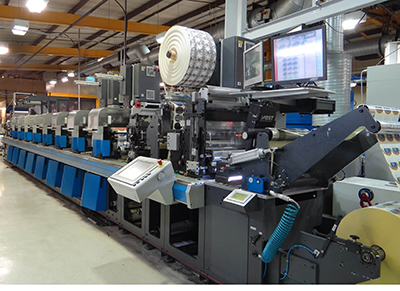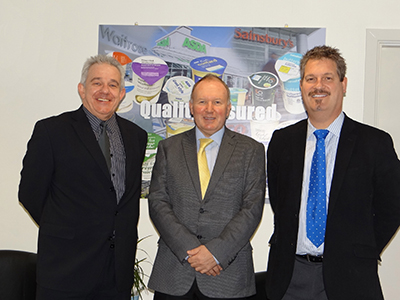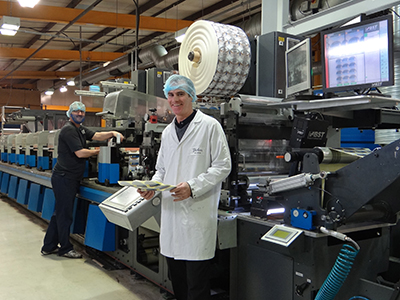T.W. Parkers Installs Gallus Flexo Presses
- Published: March 15, 2013
ST. GALLEN, SWITZERLAND | Gallus Ferd. Ruesch AG reports that T.W. Parkers, a self-adhesive label and packaging converter and a leading supplier of "post-mold" labelling, has installed two Gallus EM 430 S lines at its plant in Bootle on Merseyside to boost efficiency and broaden the scope of its production capability. The two flexo presses replace three older 330-mm wide presses, and according to Parkers, have "doubled running speeds and have the additional benefit of a wider web width."

Established originally in 1952 as a supplier of paper bags to the grocery trade, the company has always been involved with food packaging and moved into labels and carton production with a mix of flexo and offset press technology. But, it was the company’s quest for innovation that led it to become an award-winning label converter when it developed specialist techniques and know-how to develop the market for post-mold labelling of food containers.
Still under family ownership, with Tim and Toby Parker at the helm, the company underwent a major program of expansion five years ago with the appointment of Eugene Roche as operations & development director, and Phil Hood as sales director. Since 2007, turnover has more than doubled to £7.3 million, and Roche is now well on course for achieving world class plant effectiveness of 88% by the end of 2013, having raised it from 55% to 78% already.

The two new Gallus presses are a key element in this improved efficiency. Part of an investment program that topped £2 million, the company chose Gallus presses after extensive testing and detailed negotiations to ensure that the manufacturer could precisely meet Parkers’ requirements, and as far as was possible to predict, future-proof customer changes in demand. “We considered all options including having our existing presses reconditioned, but came to the conclusion that to move the game on, we needed a fresh start. The Gallus machines offered that, handling all of the customer jobs we test printed,” explained Roche. He is also quick to praise the support and understanding of the Gallus teams in the UK and St Gallen, who listened carefully to Parkers’ particular needs and created a special solution to meet them.
The Gallus EM 430 S is a further development of Gallus’ existing 410-mm wide press, and those at Parkers were the first off the production line, so a close working liaison between manufacturer and user was always going to be essential to maximize the benefit for both. Key to the success of the new presses has been their ability to hold tight register at high speed on PET, foil, and unsupported film materials. “The Gallus’ ability with fine print and cold foil has given us a useful sales tool because it’s a reliable form of added value decoration,” explained Hood, adding: “We now have an extended and more versatile capability across a variety of substrates, and an improvement in quality that is out of all recognition.” Part of the investment package included web monitoring with a camera to improve quality. Fitted with visual and audible warnings, the inspecting units can be set to pre-determined parameters to allow the presses to run at high speed.

Specified with eight UV-flexo stations, cold foil laminating, automatic register, and two die stations, the Gallus EM 430 S is something of a hybrid, with servo drive, and crucially for ease of operation, sleeve technology on each station for the loading and unloading of print cylinders and anilox rolls. Its modular platform design concept allows for flexo and screen heads to be switched quickly and easily, and with its sliding touch screen panel that allows the operator to control the press from any point along the line, it is well suited to short and medium run work on paper and plastic substrates.
According to Eugene Roche, the new Gallus presses have changed the mindset at Parkers. By listening closely to our requirements, the Swiss manufacturer has: “created two pieces of high quality engineering that exactly meet our needs for production efficiency, and done so in a bespoke and flexible package that made commercial sense for us and them,” he said. Roche claims the staff at Parkers is keenly aware of the need for enhanced productivity, and has enjoyed a £1 million increase in turnover since the Gallus presses were installed. Their arrival prompted a rethink on the production floor, which brought about a change in workflow pattern, and Roche has instigated the "pit stop" mentality to reduce downtime to a minimum.
Currently, production divides between PET and aluminum lids (technically known as diaphragms), self-adhesive labels, and post-mold labels applied to pots. Virtually all work carried out at the Bootle site is for the food industry, and in 2012 the company attained BRC accreditation that allows it to supply all supermarkets with a continuous audit trail. Interestingly, the market for lids in the UK differs from the rest of Europe. “Most UK supermarkets and packers prefer the print finish and flexibility of PET,” commented Phil Hood.












